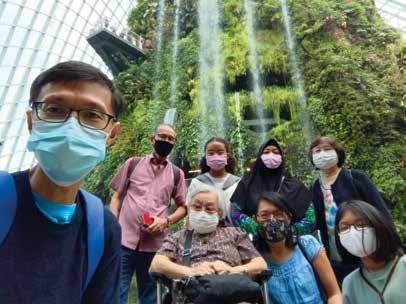
4 minute read
THINK
Dr Marcus Ong is a member of the Methodist Church of the Incarnation. He is an Emergency Physician and Clinician Scientist who has been on the frontlines fighting COVID-19 since January 2020. / Photo courtesy of Dr Marcus Ong
Ten reasons
for getting vaccinated
As Singapore’s COVID-19 vaccination programme is underway, the campaign faces challenges from vaccine scepticism or rejection. A recent study of more than 30,000 people in Singapore revealed that roughly 40 per cent were agreeable to vaccination, 20 per cent rejected it and the remaning 40 per cent were undecided.
I have already received both doses of the vaccine and would like to offer 10 reasons why I strongly encourage my parents, family and friends to get vaccinated.
1 COVID-19 is a serious and deadly disease
The COVID-19 global pandemic has claimed more than 3 million lives worldwide and caused unprecedented personal, social, economic and health impact. Singapore, with more than 60,000 recorded cases and 30 deaths, has not been spared. Fortunately, we have so far been able to protect our healthcare system and vulnerable patients, unlike countries where hospitals have been overwhelmed. However, we should not take this for granted.
2 COVID-19 preys on the elderly and the weak
COVID-19 impacts especially the elderly and those with chronic medical conditions. These groups have many times the death rates compared to younger people. There is also a condition called “long COVID”, where people who recover continue to feel unwell for weeks or even months. Ironically, the young and healthy may have mild, or even no, symptoms but are very effective at unknowingly spreading the disease to others, as they may feel well. We need to protect the vulnerable.
Registration at our Columbarium Office (Level 5) Monday to Friday, 9.00am to 5.00pm (Closed on Public Holidays).
3 Beyond impacting health, it has had devastating effects on people, society and nations
As a frontline doctor, I have seen how COVID-19 has impacted our patients. This is not just on those who contract the disease, but also those impacted by indirect effects on the healthcare system due to strains on manpower, treatment capacity and delays to routine care. There is also the mental health, economic and social impact. This impact is magnified in countries that were already struggling before the pandemic. Everyone needs to play their part to help in this fight.
4 There is a safe and effective treatment for COVID-19
The good news is that there has been a breakthrough in our fight against COVID-19—the advent of safe and effective vaccines. Based on real-world experience in Israel which has now vaccinated the majority of its vulnerable population, the vaccine is more than 90 per cent effective in reducing serious complications. There is also good evidence that even if you get infected, vaccination reduces the chances of you transmitting the disease.
5 Vaccinations are one of the most proven treatments in medicine
There is overwhelming evidence for the effectiveness and safety of vaccinations. Consider the eradication of smallpox and control of polio globally in the recent past. Currently, more than 225 million people worldwide have received at least one dose of the COVID-19 vaccine, with comparatively few reports of major adverse events. Singapore’s Ministry of Health (MOH) has also been careful to review all vaccines before approving them for local use. There is actually more data proving the safety and effectiveness of vaccines than all the over-the-counter medications, and the traditional and “herbal” remedies we use.
6 Vaccination reduces our personal risk as well as the risk to others
Besides protecting ourselves, vaccination also protects those who are not able or eligible to be vaccinated. This is the concept of “herd immunity”, which is that we can break the chain of infection if a sufficient proportion of the population is immune. So far, more than 500,000 people in Singapore have received at least one dose of the vaccine. In order to reach herd immunity, experts advise aiming for 80 to 90 per cent of our population to be vaccinated. We are still far from that target.

Dr Ong with family at an outing to Gardens by the Bay
7 We should not subscribe to misinformation and conspiracy theories
Unfortunately, vaccine acceptance has been challenged by inaccurate and even fake news, conspiracy theories and misinformation. Some of these have even claimed religious/ethical sanction. Understandably, many are uncertain, worried and confused. In times such as these, the Church should be a beacon of truth and light, to help protect our people and communities.
8 We can overcome our fears and anxieties
All medications have side effects. After my second dose of the vaccine, I had a slight fever, muscle aches and lethargy. However, I was able to work with the help of some paracetemol and did not need medical leave. Some patients may have allergic reactions. However, the MOH has clear eligibility guidelines for vaccination and has ensured that vaccination centres are well equipped to handle any serious allergic reactions. We can encourage each other to help overcome our fears.
9 We honour the sacrifices others have made
This is actually the second time I am going through a pandemic. I was a junior Emergency Physician during the 2003 SARS outbreak, when my friend and mentor, Dr Alexandre Chao, gave his life protecting others. We honour his sacrifice, and the sacrifices of countless frontline workers around the world, when we choose to get vaccinated.
10 We love God by loving our neighbour
Choosing to get vaccinated is an act of love. Jesus said: “A new command I give you: Love one another. As I have loved you, so you must love one another. By this everyone will know that you are my disciples, if you love one another” (John 13:34–35, NIV). When we choose to get vaccinated, we are demonstrating we love our neighbour and love God.










